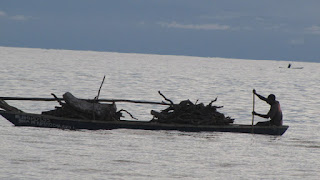Karibuni, Baraza la Waganga Uingereza
lilipitisha sera ya kutomruhusu daktari wa kigeni kufanya kazi bila kufuzu
mtihani wa Kiingereza fasaha. Ina maana ili kutibu wagonjwa lazima uimanye
lugha ya wenyeji vizuri. Wenyeji wanathamini sana lugha yao mama- bila
kuichanganya nganya na kuibandika
bandika viraka.
Mwandishi maarufu wa Kiswahili fasaha, Adam Shafi akiwa Uingereza mwaka 2007.
Picha na F. Macha
Msemaji wa Baraza hilo alipohojiwa
na runinga ya “Sky” alijitoa mwenyewe kama mfano:
“Nilisoma Kifaransa nikiwa
sekondari. Ninaweza kuongea Kifaransa cha kuombea maji. Ila nilipofanya kazi
kwao kama mganga nlikua na matatizo
maana sikuyajua maneno au misemo ya taaluma ya uganga ipasavyo. Ikabidi niende
kozi. Ni hatari sana kutibu watu kama unaboronga lugha.”
Akiwa na maana kujua lugha
juu juu au sawasawa ni mambo mawili tofauti. Wenzetu waliondelea wanathamini
sana kufahamu lugha sawasawa badala ya kubabaisha.
Nimetathmini sera hiyo ya
Waingereza ili kuongelea suala la Ki-Swanglish ambacho kinaendelea kuzaa chawa Tanzania.
Miezi michache iliyopita nilikua kwenye kikao na kundi la Wabongo wenzangu hapa
Ulaya, mzalendo mmoja akauliza: “ Bwana Macha hapendi sana kuchanganya
changanya maneno ya Kiingereza na Kiswahili.”
Kitabu kipya cha Adam Shafi- kinachoendeleza Kiswahili Fasaha. Picha toka Blog la KiSwahili Afrika Mashariki











